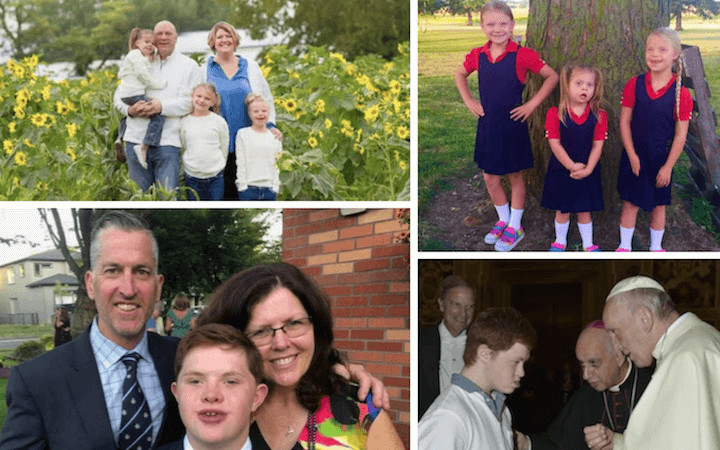The Program for Inclusive Education is pleased to introduce Jill Reffett and Jeanne Loftis, two amazing advocates for inclusion in Catholic schools. Both women direct non-profit organizations that advocate and provide support for Catholic schools in their pursuit to include ALL students. Jill is the executive director of EMBRACE and Jeanne co-founded Oregon ICE. PIE will highlight these organizations in individual blogs, but now we highlight their personal journeys as mothers of children with Down syndrome on the heels of Down Syndrome Awareness Month. Thank you, Jill and Jeanne for your tireless efforts to welcome, serve, and celebrate ALL students, as well as your personal accounts!
~Christie Bonfiglio, Ph.D.; Director of the Program for Inclusive Education
The Reffett's Story (An Elementary Perspective)
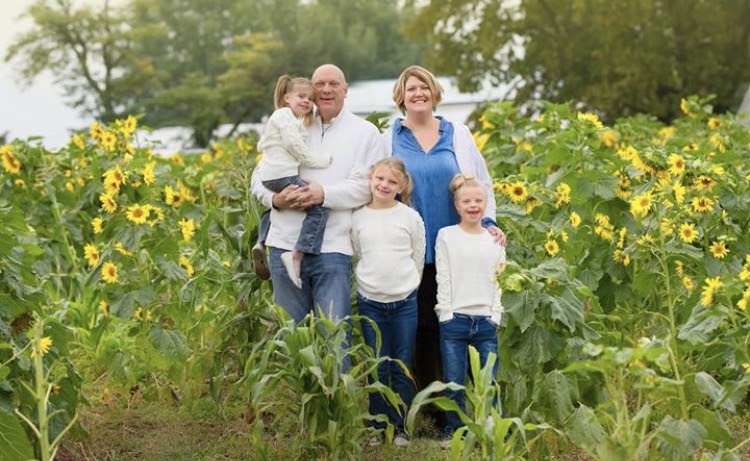
Eleven years ago we got the gift we never knew to ask for when our oldest, RayLee, was born with Down syndrome. RayLee is quiet, a calming soul. She is quite the opposite of what you may expect from someone with Down syndrome. She can make you feel like the very center of the world with an insistent, yet gentle, snuggle into the chair next to you; a light hand fluttering across your cheek; and a quietly whispered "soft." She is meditation bottled up in a human.
After RayLee was born, professionals informed us that our chances of a second child with Down syndrome dramatically increased after age 35, so we immediately got pregnant with Sophie—born just 13 months after Raylee and two weeks before my 35th birthday. Sophie is the epitome of love. It oozes from her pores. When she sees someone with Down syndrome, she geeks out; she has to get to them and know them. Sophie is already, at 10, a radical inclusionist and advocate, well-versed in why inclusion benefits all. If she had her way, we'd all have an extra chromosome, and the world would then be righteous.
Then, there is Mila. We adopted her a couple of years later, knowing full well that she had Down syndrome. Mila is a firecracker. She sleeps like a stone, then sits straight up, and doesn't stop until she drops. We tell people she is busy, but when they experience her first hand they inevitably comment on how she never stops. And talk man, she doesn't quit. She is either telling you just exactly how it is, or self-talking about how she needs to. Mila is joy, laughter, and feistiness wrapped up in a teeny, tiny, abs-of-steel package, coiled to spring at any moment. Opposites? It does not begin to describe RayLee and Mila...and we have Sophie cushioned right between.
Full disclosure: we didn't start out in a Catholic school. We didn't think it was an option because our daughters RayLee and Mila have Down syndrome. I share that because if you don't have parents of children with disabilities asking to come to your school, it is likely they don't believe they would be welcome. RayLee attended kindergarten twice. The first go was in the public school in my small hometown, and it was an eye opener. At this point, we had been attending the National Down Syndrome Congress Conference for five years, so we knew what was possible, but the school did not. Mid-year we opted to pull her out and pursue another option. But what?
We lived in a small, rural area with few students with disabilities and a county special education director who did not believe in inclusion. Students were still bussed to segregated programs based on diagnosis. At that year's National Down Syndrome Congress Conference, we met Beth Foraker of the National Catholic Board on Full Inclusion and Lynn Hire of FIRE in their breakout session on Catholic school inclusion. We left that meeting excited! We called our parish school and they immediately said no. We proceeded to call all four Catholic schools in our community, got two quick nos and one "Welllll, I don't know." At the last one, Blessed Sacrament in Quincy, Illinois, Fr. Mike Kuse said, "Yup! I don't know how, but all children should have the opportunity to get a Catholic education!" That "yes" not only gained Blessed Sacrament students, but our family. Our extended family changed from the parish we had attended for three generations to a parish that meant it when they said, "All are welcome."
Over the next few years we worked with Blessed Sacrament to get more training, attend conferences, bring in experts and develop a school-family partnership that made the inclusion of our daughters with disabilities a benefit to them and the entire community. We repeatedly heard from parents how our daughters taught their children what it really meant to be kind, to care for one another, and to be Catholic. It took regular communication between us and the school. My husband Chris even took a teaching position at the school to help our girls and the school's inclusive efforts as a whole. He also wanted to ensure that he personally was an educator who exercised inclusive principles in the classroom and wasn't just an administrator telling others how they should, since he'd become an administrator shortly after RayLee was born.
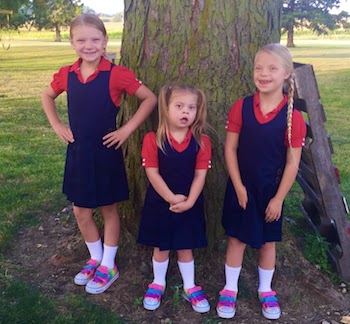 At Blessed Sacrament, we were part of a beautiful opportunity—a chance to see that inclusion is first and foremost about love, welcome and mindset. The skills and practices can be built, but if you have a school community and/or educators who do not believe students with disabilities should be there, it will be challenging. Blessed Sacrament was not a wealthy school, and we could not afford to pay for additional resources on top of tuition for our children. But they wanted our children to be a part of their community. Those teachers walk their faith and welcome all every single day.
At Blessed Sacrament, we were part of a beautiful opportunity—a chance to see that inclusion is first and foremost about love, welcome and mindset. The skills and practices can be built, but if you have a school community and/or educators who do not believe students with disabilities should be there, it will be challenging. Blessed Sacrament was not a wealthy school, and we could not afford to pay for additional resources on top of tuition for our children. But they wanted our children to be a part of their community. Those teachers walk their faith and welcome all every single day.
Last year we were recruited to Kansas. We've always lived our lives with the "send me" mentality, and, well, the call came. We decided early on in our journey that this cannot only be for our children. True and meaningful inclusion has to be for all who want it. It has to be who we are as a faith community. Chris is at a small Catholic school working to build inclusion from scratch, and I work for EMBRACE, a program that raises funds to provide resources and development to inclusive Catholic schools in the Archdiocese of Kansas City. Eight months into our new journey COVID-19 hit, and it felt like we hit a brick wall. But this has not stalled our efforts.
This summer, Chris started an inclusive work group of parishioners and school parents who want our school to be intentionally inclusive of students with disabilities. Several of them work in special education, disabilities-related disciplines, and research areas. They are building the roadmap—the blueprint that Chris will follow to help develop an inclusive school. Our priest, Fr. John Cousins has been very adamant that this IS who we are.
Now...we build.
The Loftis' Story (A High School Perspective)
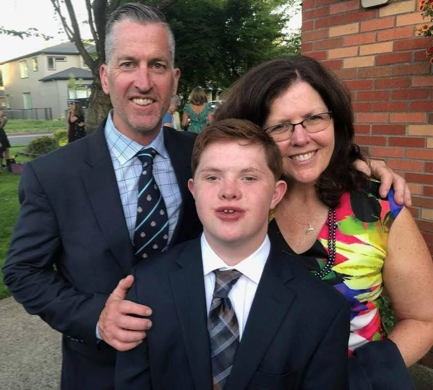
Joey Loftis is courageous, kind, loving, very strong, and he has Down syndrome—his superpower. His motto for life is "Never give up," which is the tagline for his favorite WWE wrestling superstar, John Cena. Almost 17 years ago, on Tax Day, God gave us a gift. We had an idea that our little boy would take us on an adventure, but we never dreamed he would take us across the U.S., twice to the Vatican, and be the catalyst for my husband and I to start a foundation supporting children with intellectual disabilities in parish schools.
With Joey we dreamed for the same as our other three older children: a Catholic education, youth sports, Boy Scouts, college, marriage. No more, no less. In kindergarten, Joey was enrolled in the same parish school with his two brothers and his sister. The school gave it a good go, but in fifth grade he was asked to leave. The staff had been relying heavily on Joey's older siblings, the oldest being 12, to resolve any behavior issues. In addition to the tuition, we were funding a full-time one-on-one aid. It was a day I was dreading but believed it inevitable. To me, it made sense. After all, I grew up in Catholic schools and knew that despite all the good the Catholic Church has to offer, supporting students with intellectual disabilities in our parish schools is not one of our strong points.
For my husband Blair, who is not a cradle Catholic, it was different. He believed that the Catholic Church had a moral obligation to support ALL children, especially those with different abilities. To him, it was integral to Catholic social teachings and fundamental to the practices of social justice prescribed by Pope Francis. Like Joey, we decided not to give up. Instead, we dove in. Eventually, we found another parish school for Joey, one that embraced inclusion and decided that educating children with disabilities was part of their mission. We moved, left our parish of 26 years, and found a new home and a new meaning of faith, hope, and charity.
We also got serious. We formed a foundation, Oregon Inclusive Catholic Education (Oregon I.C.E.), we collaborated with other similar organizations such as the National Catholic Board on Full Inclusion (NCBFI), Catholic Coalition for Special Education (CCSE) with the Archdiocese of Baltimore Maryland and Archdiocese of Washington D.C., Enriching Many By Reaching All in Catholic Education (EMBRACE) with the Archdiocese of Kansas City, Foundation for Inclusive Religious Education (FIRE) Kansas City — St. Joseph, and One Classroom with the Archdiocese of St. Louis. We began attending the National Catholic Educational Association Annual Conferences. We attended the World Meeting of Families in Philadelphia in 2015 and Dublin, Ireland in 2018.
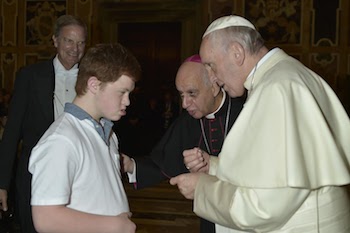 Through all the travels in search of the true meaning of inclusion in Catholic schools, two trips inspired us the most. In 2015, we traveled to Rome for the Extraordinary Jubilee of Mercy — a Jubilee day devoted to the sick and bearers of disabilities. There we met an extraordinary priest, now Msgr. Geno Sylva with the Archdiocese of Patterson, New Jersey. Msgr. Geno arranged to have Joey sit at the altar while Pope Francis delivered a full mass in St. Peter's Square. Two years later, we were invited back to Rome for a conference organized by the Pontifical Council for Promoting New Evangelization and Catechesis of People with Disabilities. That is when Joey met Pope Francis and gave him a medallion of Pope Francis. Not to be blessed, but as a gift. There was a moment of confusion, but as you would expect, Pope Francis got it.
Through all the travels in search of the true meaning of inclusion in Catholic schools, two trips inspired us the most. In 2015, we traveled to Rome for the Extraordinary Jubilee of Mercy — a Jubilee day devoted to the sick and bearers of disabilities. There we met an extraordinary priest, now Msgr. Geno Sylva with the Archdiocese of Patterson, New Jersey. Msgr. Geno arranged to have Joey sit at the altar while Pope Francis delivered a full mass in St. Peter's Square. Two years later, we were invited back to Rome for a conference organized by the Pontifical Council for Promoting New Evangelization and Catechesis of People with Disabilities. That is when Joey met Pope Francis and gave him a medallion of Pope Francis. Not to be blessed, but as a gift. There was a moment of confusion, but as you would expect, Pope Francis got it.
It was after these trips to the Vatican, meeting with all the wonderful people at NCEA, and collaborating with the good folks pioneering other organizations like ours that we found our purpose: educate the educator. We would focus on providing the teachers, staff, and administrators in our Archdiocese of Portland with meaningful opportunities to understand why inclusion is so important and to learn how it can be accomplished in parish schools. We have been truly blessed. At our annual conferences we have been able to bring in the experts on Catholic inclusive education. Nationally recognized names like Dr. Christie Bonfiglio from the University of Notre Dame, Dr. Michael Boyle and Doreen Engel from Loyola University Chicago, and other experts who are making inclusion work in their parish schools. This has made a huge impact helping to accelerate the pace of inclusion in the Archdiocese of Portland.
We continue to give thanks every day for the journeys we have taken and the people we have found on our path who were eager to support us. Oh, and Joey...well, he is now a sophomore at Central Catholic High School in Portland in its RAMS program. He is fully included in the curriculum with the help of their amazing peer mentor program. Pre-COVID, he attended football games, basketball games, dances, and lifted weights with the football team's "Strong Man" club at 5:30 a.m. three days a week. He is now in a virtual production of the fall play. Every day he talks about going to college in only two years, finding a girlfriend, and eventually getting married.
Our advice: trust in Jesus and never give up.
PIE
The Program for Inclusive Education has no better advice than that provided above. "Trust in Jesus and never give up." So, "Now...we build." Catholic schools have the capability and the obligation to provide educational opportunities and faith communities for ALL students. Every child is made in His image and they deserve a seat at the table.
PIE is now accepting applications for its fifth cohort. Be a part of making inclusive education a possibility for the RayLees, Sophies, Milas, and Joeys in your Catholic school. Apply now and welcome, serve, and celebrate ALL students!
For more information about Down syndrome, please visit the following sites:
 Alliance for Catholic Education
Alliance for Catholic Education
